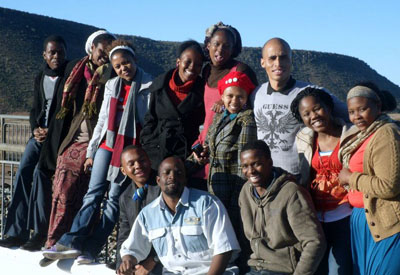Latest News Archive
Please select Category, Year, and then Month to display items
12 January 2024
|
Story Nonsindiswe Qwabe
|
Photo Sonia Small
 Since joining the UFS in 2008, Dr Grey Magaiza has worked extensively on approaches that can foster the socio-economic transformation of societies.
Since joining the UFS in 2008, Dr Grey Magaiza has worked extensively on approaches that can foster the socio-economic transformation of societies.
“The future should be one where communities can decide on their development agenda and futures. That’s the most important for me.” Dr Grey Magaiza, Deputy Director of the Centre for Gender and Africa Studies (CGAS) and Head of the Community Development programme on the Qwaqwa Campus, is passionate about capacitating communities to be agents of change and advancement. His vision for the future emphasises the empowerment of communities to take charge of their development by actively participating in decision making and the implementation of development projects that can improve their lives.
Since joining the UFS in 2008, Dr Magaiza has worked extensively on approaches that can foster the socio-economic transformation of societies. Over the years, he has crafted his research speciality into one that he is most proud of – being an interdisciplinary scientist immersed in the development of communities.
“I’m in a fortunate position of researching what I like. I say ‘fortunate’, because I’ve taken the time to understand what I’m passionate about, which is the overall field of rural livelihoods and livelihood futures – in short, community development. My research starts from an engaged university, understanding the elements that a university must use to enhance transformation and relevance to its immediate community in terms of development.”
One of the ways he has done this is by looking at social entrepreneurship as a development approach for young people in a rural setting. Through workshops with non-profit and civic organisations in Qwaqwa, Dr Magaiza has been helping these organisations to map out their needs and actively meet them through the involvement and support of external role players.
“We understand that communities are part of the national development agenda, but even that national agenda respects community knowledge and intentions and allows communities to shape their identity. A critical enabler of this is community organising. You bring back the capacity in communities to have dialogues on issues affecting them as spaces for engagement, knowledge exchange, and for people to just talk about their way forward.”
By enabling communities to define their development agenda, they can address their specific needs, challenges, and aspirations, he said. “When I look at livelihood futures, it’s quite an exciting aspect of my work – it’s like looking into a fortune tellers’ globe, because you’re not deciding for communities what they should do, but the communities themselves take those decisions.”
Students aim to make a difference
2012-08-12
 |
| Besides their work with the learners, Legendary Bethulie also wants to expose them to the rich history of Bethulie and showcase the beauty of the small town. The town had the largest concentration camp during the Anglo Boer war and it boasts the longest bridge in South Africa – the DH Steyn Bridge, a 1,2 km rail and road bridge. |
A group of students has taken the initiative to educate high school learners about different careers. They travelled 180 km to Bethulie, a small town in the southern Free State, to motivate, inspire and expose learners from the Wongalethu Senior Secondary School to different career paths. This event will take place in Bethulie again at the end of the first term next year.
The event was organised by the Legendary Bethulie group, which is campaigning for a child development programme, community centre and also to develop further the annual Bethulie career exhibition. The group intends to equip children from Bethulie and nearby towns with the necessary skills to be successful in life, irrespective of their home backgrounds. The group also wants to expose them to different career paths as well as offer tutoring opportunities. It also aims to minimise the number of learners who become victims of drug abuse and HIV.
The organisation is still growing and would like to access funding from different institutions and companies as it is currently financed by the community.
Students who wish to take part in next year’s event can contact Luyanda Lunga Noto at luyanda.noto@gmail.com.
- Luyanda Noto